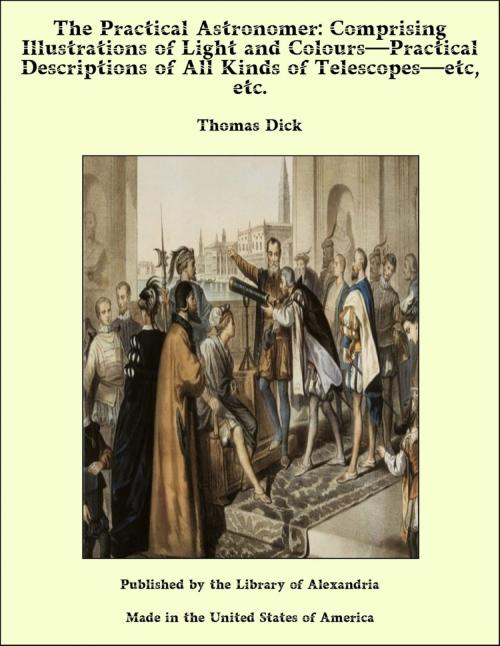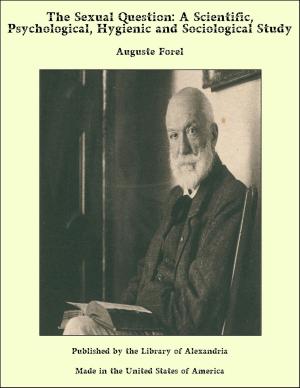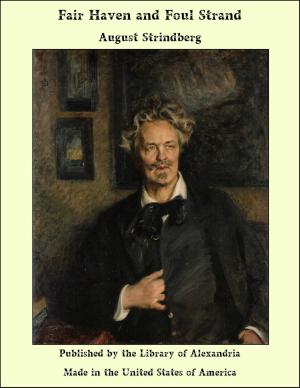The Practical Astronomer: Comprising Illustrations of Light and Colours—Practical Descriptions of All Kinds of Telescopes—etc, etc.
Nonfiction, Religion & Spirituality, New Age, History, Fiction & Literature| Author: | Thomas Dick | ISBN: | 9781465614896 |
| Publisher: | Library of Alexandria | Publication: | March 8, 2015 |
| Imprint: | Language: | English |
| Author: | Thomas Dick |
| ISBN: | 9781465614896 |
| Publisher: | Library of Alexandria |
| Publication: | March 8, 2015 |
| Imprint: | |
| Language: | English |
Light is that invisible etherial matter which renders objects perceptible by the visual organs. It appears to be distributed throughout the immensity of the universe, and is essentially requisite to the enjoyment of every rank of perceptive existence. It is by the agency of this mysterious substance, that we become acquainted with the beauties and sublimities of the universe, and the wonderful operations of the Almighty Creator. Without its universal influence, an impenetrable veil would be thrown over the distant scenes of creation; the sun, the moon, the planets, and the starry orbs, would be shrouded in the deepest darkness, and the variegated surface of the globe on which we dwell, would be almost unnoticed and unknown. Creation would disappear, a mysterious gloom would surround the mind of every intelligence, all around would appear a dismal waste, and an undistinguished chaos. To whatever quarter we might turn, no form nor comeliness would be seen, and scarcely a trace of the perfections and agency of an All Wise and Almighty Being could be perceived throughout the universal gloom. In short, without the influence of light, no world could be inhabited, no animated being could subsist in the manner it now does, no knowledge could be acquired of the works of God, and happiness, even in the lowest degree, could scarcely be enjoyed by any organized intelligence. We have never yet known what it is to live in a world deprived of this delightful visitant; for in the darkest night we enjoy a share of its beneficial agency, and even in the deepest dungeon its influence is not altogether unfelt.1 The blind, indeed, do not directly enjoy the advantages of light, but its influence is reflected upon them, and their knowledge is promoted through the medium of those who enjoy the use of their visual organs. Were all the inhabitants of the world deprived of their eye-sight, neither knowledge nor happiness, such as we now possess, could possibly be enjoyed.
Light is that invisible etherial matter which renders objects perceptible by the visual organs. It appears to be distributed throughout the immensity of the universe, and is essentially requisite to the enjoyment of every rank of perceptive existence. It is by the agency of this mysterious substance, that we become acquainted with the beauties and sublimities of the universe, and the wonderful operations of the Almighty Creator. Without its universal influence, an impenetrable veil would be thrown over the distant scenes of creation; the sun, the moon, the planets, and the starry orbs, would be shrouded in the deepest darkness, and the variegated surface of the globe on which we dwell, would be almost unnoticed and unknown. Creation would disappear, a mysterious gloom would surround the mind of every intelligence, all around would appear a dismal waste, and an undistinguished chaos. To whatever quarter we might turn, no form nor comeliness would be seen, and scarcely a trace of the perfections and agency of an All Wise and Almighty Being could be perceived throughout the universal gloom. In short, without the influence of light, no world could be inhabited, no animated being could subsist in the manner it now does, no knowledge could be acquired of the works of God, and happiness, even in the lowest degree, could scarcely be enjoyed by any organized intelligence. We have never yet known what it is to live in a world deprived of this delightful visitant; for in the darkest night we enjoy a share of its beneficial agency, and even in the deepest dungeon its influence is not altogether unfelt.1 The blind, indeed, do not directly enjoy the advantages of light, but its influence is reflected upon them, and their knowledge is promoted through the medium of those who enjoy the use of their visual organs. Were all the inhabitants of the world deprived of their eye-sight, neither knowledge nor happiness, such as we now possess, could possibly be enjoyed.















